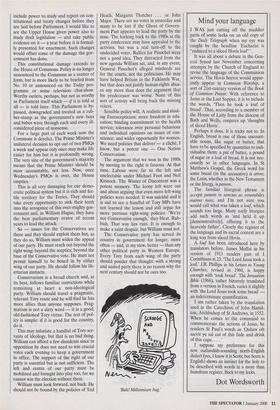Mind your language
I WAS just cutting off the muddier parts of some leeks on an old copy of the Daily Telegraph when my eye was caught by the headline 'Eucharist is "reduced to a sliced Hovis loaf" .
It was all about a debate in the Gen- eral Synod last November concerning attempts by the Church of England to revise the language of the Communion service. The Hovis horror would appar- ently appear in Common Worship, a sort of 21st-century version of the Book of Common Prayer. With reference to Jesus at the Last Supper, it is to include the words, 'Then he took a loaf of bread'. That, according to a member of the House of Laity from the diocese of Bath and Wells, conjures up 'thoughts of sliced Hovis'.
Perhaps it does. It is tricky not to. In English, bread is one of those uncount- able nouns, like sugar or butter, that have to be specified by quantities to indi- vidualise them: a pat of butter, a pound of sugar or a loaf of bread. It is not nec- essarily so in other languages. In St Matthew's Gospel, the Greek word for some bread (in the accusative) is arton; the Latin, whether in the New Testament or the liturgy, is panem.
The familiar liturgical phrase is accepit panem in sanctas ac venerabiles manus suas; and I'm not sure you would call what was taken a loaf, which sounds too large. Many early liturgies add such words as 'and held it up [demonstratively], offering it to the heavenly father'. Clearly the register of the language and its sacral context are a long way from sliced Hovis.
A loaf has been introduced here by translators before. James Moffat in his version of 1913 renders part of I Corinthians xi 23: The Lord Jesus took a loaf.' J.B. Phillips in his Letters to Young Churches, revised in 1960, is happy enough with 'took bread'. The Jerusalem Bible (1966), rather bizarrely translated from a version in French, varies it slightly with 'the Lord Jesus took some bread' an indeterminate quantification.
I am rather taken by the translation used in the Catechism of John Hamil- ton, Archbishop of St Andrews, in 1552. When he comes to the command to commemorate the actions of Jesus, he renders St Paul's words as `Quhaw oft saevir ye sal eat of this fude and drink of this cupe. . . . '
I suppose my preference for this now outlandish-sounding north-English dialect (yes, I know it is Scots; but Scots is English) shows an instinct for the holy to be described with words in a more than humdrum register. Back to my leeks.
Dot Wordsworth


















































 Previous page
Previous page